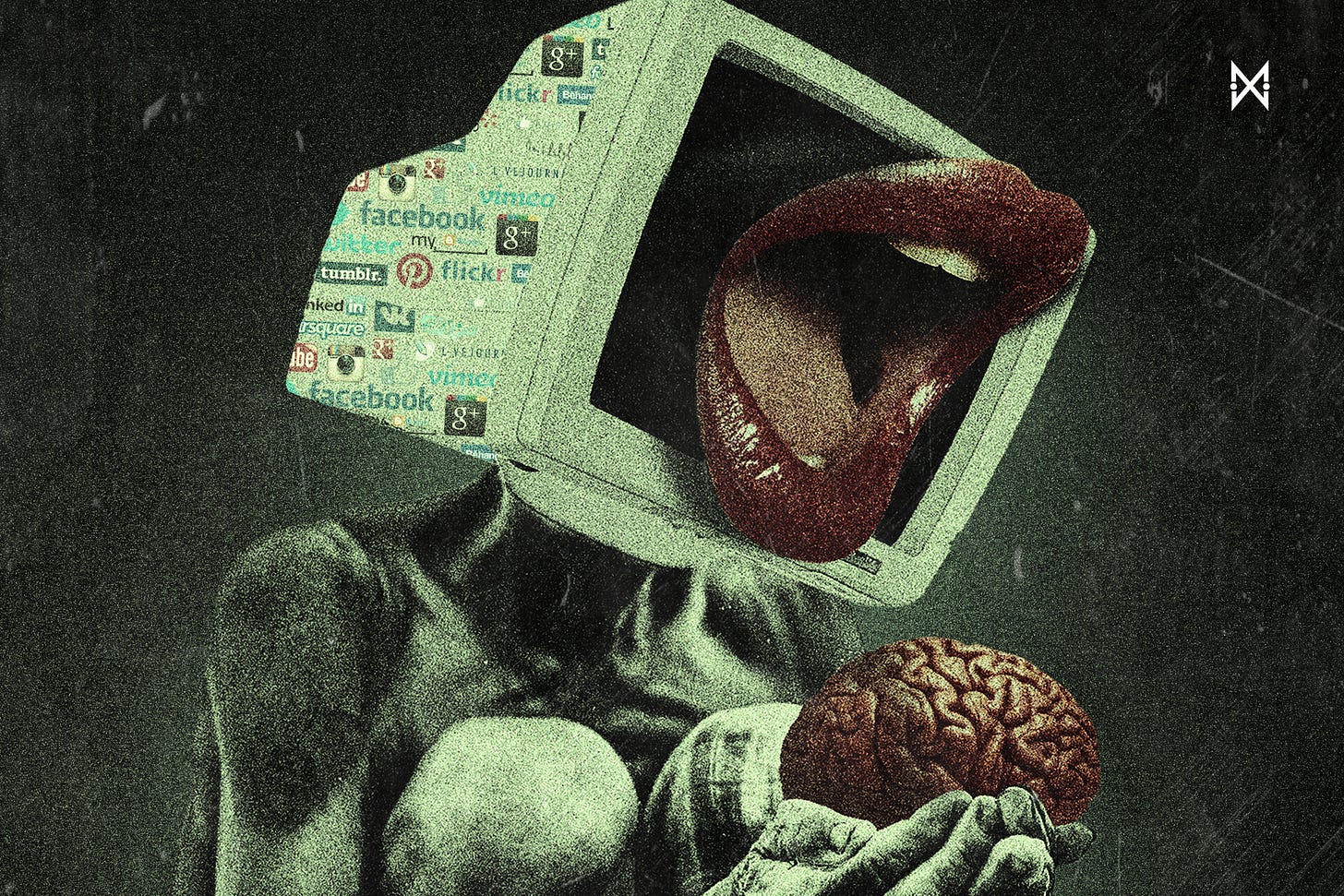Ideological Identification: When Cultism Becomes Common
A key lesson on the path to psychological liberation
WHERE DO I START?!? 🫨
I want to talk to you about Ideological Identification (or ID-ing with ideas), which is a term I coined to describe the phenomenon of reducing oneself to one’s beliefs and “becoming limited by labels.”
I coined this term back when I was running UnMinding. Basically, as I healed from the fundamentalism and cognitive distortions I picked up from being born and raised in a cultic church, I documented my healing revelations and epiphanies in the form of a blog and a few YouTube videos.
I went into the UnMinding process thinking it was just going to be about healing from the damage done by abusive cult leaders and high-demand groups. I thought my struggle with cultism was too niche or fringe to be relevant to most people, so I aimed my content at fellow cult survivors.
However… it didn’t take long to realize that the valuable lessons I was learning about psychological freedom were applicable to far, far more than just cultists.
What I learned in my cult recovery process is actually applicable to everyone.
Sadly, this fact has frightened and angered many people over the years.
As I’ve grown and healed, it’s become abundantly (and uncomfortably) clear that cognitive distortions are not exclusive to cultists — rather, they’re quite commonplace! Anyone can struggle with black-and-white thinking, an us-versus-them mentality, and confirmation bias (just to name a few).
But before I expand on that, let’s go on a lil’ sidequest, shall we? 🙃
I am not saying that I think “cults are just a microcosm of culture,” which is an attempt at a ~hot take~ usually made by people who’ve never been in a cult (and therefore have no idea what they’re talking about).
Having endured real cult trauma, it still irks me to no end when people throw around the word “cult” to mean “any group I don’t like,” like liberals or the Catholic church. 😒 (Come on, guys, please stop doing this. Words mean things.)
So personally, I maintain that the word “cult” should be defined as
a mission-oriented high-demand group or relationship in which an abusive charismatic leader seeks to completely control, and extract resources from, their follower(s).
Yes, there are grey areas. Yes, there are degrees of cultism. Blah blah. Defining “cult” is not the point of this post.
The point is: Because being in an actual cult is a relatively uncommon experience, this gives rise to a particular difficulty in talking about the commonness of cognitive distortions.
See, cult survivors carry a stigma. The stigma is that we’re stupid.
So it’s easy to see why, when I talk about how everyone is capable of cognitive distortions, people react like this:
“What are you trying to say about me?! Are you saying I’m stupid?!”
No, I’m not. I’m saying you’re human, and these issues are a symptom of the human condition — the desire to belong, to be loved, and to be accepted. Nothing more, nothing less.
/sidequest
Now let’s get to the heart of this post: Ideological identification.
Ideological identification is when somebody bases their concept of Self on something they believe in.
This may sound extreme, but it’s not. It’s actually becoming more common by the day, in this perfect storm of widespread Internet addiction, algorithmically-curated online echo chambers, avatar-based personas, and increasing political division and derision.
All it takes to become identified with an idea, is to label oneself as a member of the subculture that promotes that idea.
For example: When I was a feminist, I called myself a feminist.
I would tell people, “I’m a radical feminist.” I’d get introduced in interviews as “a radfem writer.” Stuff like that.
On the surface, it was merely an accurate description of my interests and priorities at the time — a convenient access point for new people to understand what I was all about.
But there were unforeseen consequences to labeling myself as a radfem (and these things applied to my liberal feminist phase, vegan phase, and Pentecostal phase as well) —
It gave other self-identified radfems the erroneous impression that we already understood each other, which compelled us to bypass the normal getting-to-know-each-other process and jump right into boundary-less closeness with each other. This led to a lot of dramatic, crash-and-burn “friendships.” (See my post on ideological friends.)
The radfem label acted as a “filter” on my social life that automatically drew feminists closer to me, and pushed non-feminists away from me — leading to an “echo chamber reality” that nuance and contradiction couldn’t penetrate.
Whenever faced with a gender-related challenge, I frequently caught myself thinking, “How should I feel about this?” or “What should I, as a feminist, do?” Then I’d seek out biased radfem sources from which to derive “my” opinions. The self-policing was automatic.
I assumed that people who weren’t into radical feminism, weren’t good people, basically. I failed to assess their character by their actions, and instead dismissed them based solely on their words.
There was this low-grade dread like a background hum in my life, always threatening to expose me and punish me somehow. If ever I laughed at a “problematic” meme, or had a contradictory thought, I couldn’t relax until I was assured that I was still a radfem. (I was like a “cancel culture” unto myself.)
This is the short list.
Is any of this sounding familiar to you?
Maybe you pride yourself on being a Conservative, and feel offended when someone compares you to a Democrat (or even a Centrist!).
Maybe you’re a Vegan and would rather have Vegan friends and consume Veganism-affirming media.
Maybe you’re a Truther who’s afraid to voice your skepticism about certain conspiracy theories.
The particulars don’t matter. What matters is the mechanism of covert self-surrender in service of a greater mission. That’s cultism made common.
You don’t have to be in a cult to experience the subtle destabilization of your identity.
Here’s the other thing about Ideological Identification:
A fluid, flexible sense of Self is not threatened by disagreements or contradictions. A person with a healthy sense of Self is nuanced and multifaceted. An ideologue is not.
The more you identify with an idea, the higher the stakes are when you’re presented with questions.
Your Self is the only thing you really “have.” Your conscious perception of your place in the world is what makes living altogether possible. Your “I AM” is precious and sacred.
So the more you define yourself in accordance with an idea, the more it will hurt when your belief system inevitably crumbles from too much questioning.
This is what I call a “Reality Collapse.”
There are degrees of this. If you simply call yourself a feminist or whatever, there are consequences to that, but arguably they’re manageable.
However, if you’ve introduced yourself to everyone as “a feminist,” then one day when you’re not a feminist anymore, you’ll have an exhausting amount of explaining to do. You might lose friends over it. Somewhere in the back of your mind, the threat of losing friends will keep you from admitting when you’re wrong.
Furthermore, if you’ve built a platform on your feminist ideology (particularly one that generates profit $$$), you’ll be even less likely to admit when you’re wrong — because now your livelihood is at stake, in addition to your sense of Self. This is why “figureheads” in various movements act like narcissists when challenged. They are afraid of the Collapse. Underneath their superficially differing beliefs, their human condition is the same.
Most ideologues do not recover from the Reality Collapse of investing their identity in a fragile idea. Either they live the rest of their lives in denial, doubling down on their erroneous beliefs because they can’t handle the feeling of cognitive dissonance… or they break, from the embarrassment of ego death.
This is why we see so much nonsense from, say, transgender-identified activists. They don’t simply identify as transhumans — they also fork over huge amounts of money to butcher themselves to prove their devotion to the belief. So it’s no wonder why they act out when challenged. Can you imagine the mortification of admitting you’re wrong after all you’ve given to the cause? — time, money, and body parts?!
The more an ideologue’s brittle belief system is challenged, the more likely they are to engage in destructive behaviors in a desperate attempt to convince themselves that the jagged split in their Inner World isn’t there at all.
All of that said, I appreciate labels as a rhetorical tool. It makes communication easier in some ways.
There’s nothing wrong with labels, or with being passionate about one’s beliefs.
This isn’t a matter of “right” or “wrong” at all, actually.
It’s more of an open challenge for you to consider on your path of personal growth:
How might you be stunting your own growth by reducing your identity to one facet of your multidimensional nature?
What are the consequences of saying “I AM _______” (fill in the blank)?
Think about it. “I AM” is a static statement. It’s more rigid than, say, “I like feminism” or “I believe we need a women’s movement.”
The statement “I am a ____” turns you into a noun — unchanging.
The second and third statements (“I like” and “I believe”) acknowledge you as agent, actively and freely choosing your interests and beliefs. It holds you accountable as the thinker of thoughts. And it leaves more room for nuance.
Personally, when I used to identify with ideas, I felt myself stagnating in life. Same friends, same conversations, same dramas, same emotions… in an endless feedback loop of self-disempowerment and externally-sourced validation.
My identity became static, and yet — paradoxically — incredibly volatile, because I’d outsourced my sense of Self to a word necessarily defined by a group. This meant that I was subject to many individuals’ perceptual lenses masquerading as a unified hivemind. You can imagine the confusion.
It was only after a made the conscious choice to stop labeling myself by my transient ideas and beliefs (especially those associated with existing subcultures/groups/movements), that my spirit became free to morph as the moment called for — according to my desires and whims, first and foremost.
Most of all, I became the primary source of my beliefs and opinions.
By forfeiting limiting labels, I have given myself the gift of multidimensionality, nuance, and change.
This is a gift you can give yourself, too.
There are lots of people currently acting like they’re under mind control, when they’re not. No cult leader is going to excommunicate them for having a different opinion.
And yet, “the cult leader in their head” compels them to condense themselves into an ever-smaller, ever-more-pressurized version of their “Self,” restricted by the existential threat of social disapproval.
If this feels like you, the good news is:
You have the right to change your mind.
Gnosis is yours to find within yourself.
You don’t need anyone’s permission but your own.
There’s plenty more I can say on this topic (it’s my life’s work, after all) but I’ll wait until I see the comments, to get a sense of how this lands with people & what questions I could do a better job of answering.









Sartre said that once you name something, you kill it. i know that's a little over the top, but like you mentioned it's liberating AF to let go of the doctrinaire stuff.
but - if i can play devil's advocate here - aren't we at a point in world history where we have to have some guiding principle, even if that's simply choosing life? don't we owe it to our less aware brothers and sisters to wake them up if we can? with the WEF breathing down our necks, do we have the luxury of riding the fence? just throwing this out there...
I’ve been blessed to know you long enough to have witnessed so much of this journey — and to have learned so much in the process. Thank you! 🙏 Now, I’m thrilled to see you reaching more and more people with this critical perspective. 💕